1
- Cryptocurrencies accepted
- 24/7 customer support
- Fast withdrawals
- Modern design
Poker is the term used to describe a family of traditional card games. The goal in this game is to assemble the best five-card hand while betting that your hand is superior to that of your opponents.
Have you thought of learning how to play this game? That’s what we are writing about in this article. We'll simplify strategies used in poker so you won’t have a hard time getting started. First, let’s go over the basics of poker.
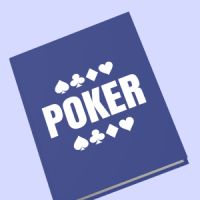
There are several types of poker games, but Texas Hold'em is the most popular. Others include the Seven-card stud, Five-card draw, Omaha, and the High low Chicago.
Each version has its own set of regulations, but the game's fundamentals remain constant. One major thing you need to do is learn the rules, and after that, you can devise your winning plan.
However, you should note that luck plays a huge part too, whether you win the game or not.
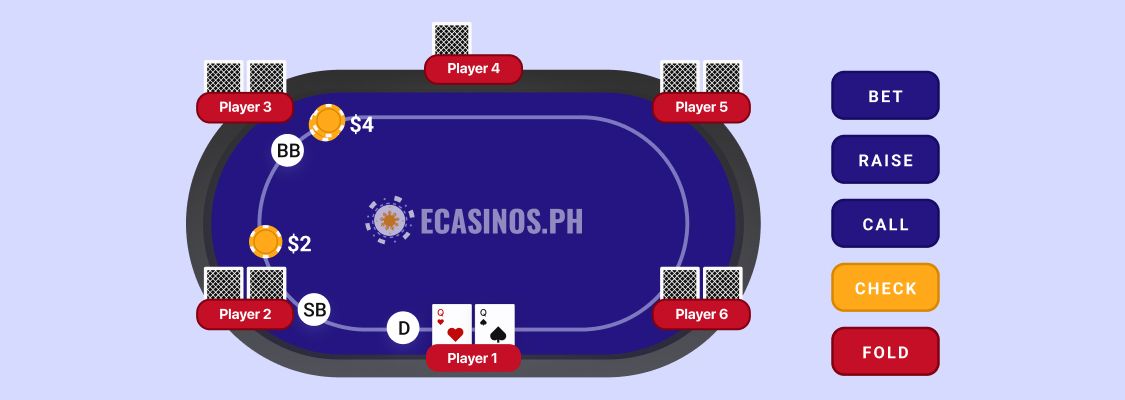
There is an old saying about poker “It takes a minute to learn, but a lifetime to master.” To effectively learn how to play a poker game, it is only right that we go through the different rules involved to maximize our wager and improve our knowledge. Here are some of them:
According to the game's regulations, poker players build hands, which are sets of 5 playing cards. The pot's winner is assessed by comparing each hand's rank to the ranks of the other hands taking part in the showdown. The highest-ranking hands win in high games like Texas hold 'em and seven-card stud. Below are the poker-hand rankings from the strongest rank to the weakest:
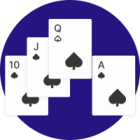
As the better hand in poker, the royal flush is ranked at the top. It has five identical cards in a row, numbered from 10 to ace, and all of the same suits.
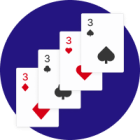
All four suits of the same card. The card with the greatest value among those on the table or in your hand completes a five-card hand.
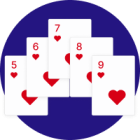
A straight flush is any combination of five consecutive cards with values from the same suit that is not a royal flush. A royal flush or another straight flush with higher-ranking cards is the only hand that can defeat it.
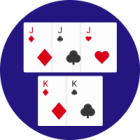
A hand that consists of a distinct pair of the same rank cards in 2 distinct suits as well as the same value card in 3 distinct suits (three of a kind). The hand with the greater or highest value three of a kind wins when more than one player has a complete house.
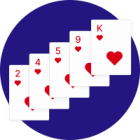
Five cards in any combination with the same suit. When two players both hold flushes, the poker hand that will win is the flush with the highest-valued card.
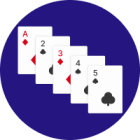
Five cards with sequential numbers and more than one type of suit. In most cases, an ace can only rank as high (above a king) or low (below a 2) on the same hand.
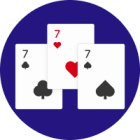
This poker hand consists of three identical cards but in three distinct suits. The hand is completed by the two highest cards remaining in addition to the three of a kind.
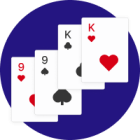
Two distinct sets of two cards with the same rank are called “Two Pairs”. The hand is completed by the highest-ranked card still in play.
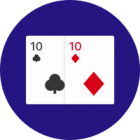
A pair of cards with the same rank but various suits. The three top-ranked cards in the deck help make up the remaining cards in the hand.
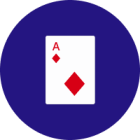
The weakest of all the hands. Your "best hand" is the highest card you possess. It is the king of clubs in this instance.
In this descending order of strength, it is important to know that a hand's strength increases with the value of the cards in it. For instance, a straight that reads 7-8-9-10-J beats one that reads 5-6-7-8-9, and two Aces beat two Queens.
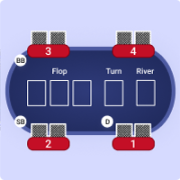
In the first stage of the game, the player on the dealer’s left will put in the small blind, and the other player who is on the left of the small blind will put in the big blind when both players have placed their forced bets in front of them.
All players get two cards to face down, one at a time, starting from the small blind. When players have their cards, the round where players can either fold, call or raise the stakes starts.
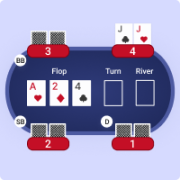
Three community cards are dealt face-up on the table during the game's Flop stage. Any player can combine these cards with their hand to create their greatest possible five-card poker hand.
Another round of betting begins, and the player in the small blind will initiate play and continue doing so until the end of the hand.
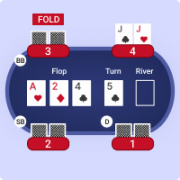
Another community card joins the table in the Turn stage, increasing the number of face-up cards to four. The third round of betting begins after the fourth card has been dealt.
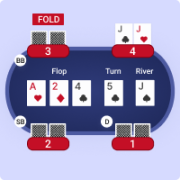
The fifth and final community card will be made public during the last phase, referred to as the River. Players must choose whether or not to proceed to "the showdown" with their hand, as this is the final betting round.
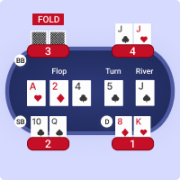
The Showdown begins following the conclusion of the final betting round. The player with the best five-card poker hand is then named the game's winner when the cards are put on the table.
The fifth and final community card will be made public during the last phase, referred to as the River. Players must choose whether or not to proceed to "the showdown" with their hand, as this is the final betting round.

This is a basic poker strategy that involves getting your opponent to reveal or fold a stronger hand than the one you have. You anticipate getting called by a weaker hand when you gamble for value. When you bluff, you bet in the hopes that your opponent will fold a stronger hand.
There are hundreds of variations of poker; you can play it for pennies or matchsticks in a social setting or for thousands of dollars in a professional setting. Playing poker online is very simple and depends on learning a few tricks. After going through our detailed guide, you are now one step away from enjoying yourself.
1
2
3